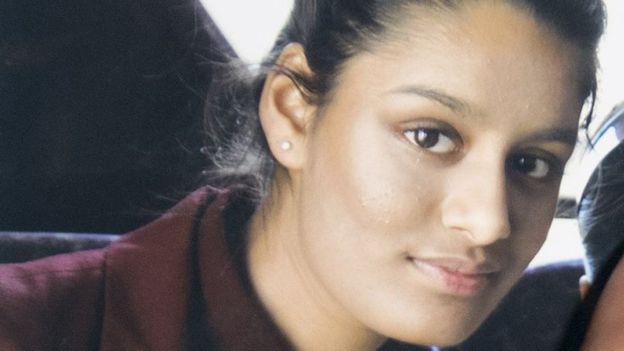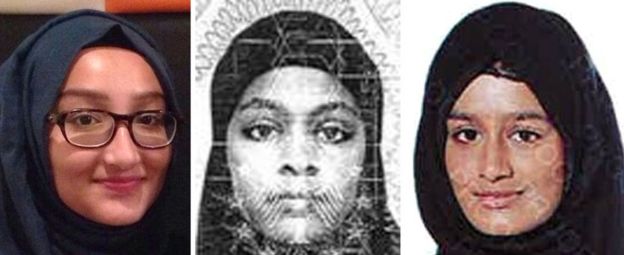
This article is more than
6 year oldMs Begum, 19, told ITV News that she found the Home Office's decision "heartbreaking", but she may try for citizenship via her Dutch husband.
Government sources said it was possible to revoke her UK nationality as she was eligible for citizenship elsewhere.
However, the home secretary suggested her son could still be British.
While he said he would not comment on individual cases, Sajid Javid told the Commons: "Children should not suffer. So, if a parent does lose their British citizenship, it does not affect the rights of their child."
Ms Begum's mother is believed to be a Bangladeshi national which means under Bangladesh law she would be too.
Ms Begum was a schoolgirl when she left Bethnal Green in 2015. She was found in a Syrian refugee camp last week after reportedly leaving Baghuz - IS's last stronghold.
She gave birth to a son at the weekend and now wants to return home.
A Home Office spokesperson said decisions to remove citizenship were "based on all available evidence and not taken lightly".
"In recent days the home secretary has clearly stated that his priority is the safety and security of Britain and the people who live here."
ITV News showed Ms Begum a copy of the Home Office's letter - which had been sent to her mother. Ms Begum said: "I am a bit shocked. It's a bit upsetting and frustrating. I feel like it's a bit unjust on me and my son."

She added: "Another option I might try with my family is my husband is from Holland and he has family in Holland.
"Maybe I can ask for citizenship in Holland. If he gets sent back to prison in Holland I can just wait for him while he is in prison."
Ms Begum's husband is a Dutch convert to Islam and is thought to have surrendered to a group of Syrian fighters about two weeks ago.
The lawyer for Ms Begum's family, Tasnime Akunjee, said they were considering "all legal avenues" to contest the Home Office decision.
He told the Independent that the Bangladesh government "does not know who she is", adding: "Our position is that to all practical purposes she has been made stateless."
Ms Begum previously told the BBC she did not have a Bangladeshi passport and had never been to the country.
Under the 1981 British Nationality Act, a person can be deprived of their citizenship if the home secretary is satisfied it would be "conducive to the public good" and they would not become stateless as a result.
Ms Begum has the right to challenge the Home Office's decision either by tribunal or judicial review, said former independent reviewer of terrorism legislation Lord Carlile, but would have to prove the home secretary had acted disproportionately.
He said it was a "complex issue" which "could run for a very long time through the courts", and Ms Begum could stay where she is "for maybe two years at least".
Lord Carlile said her baby may be entitled to British, Dutch and Bangladeshi nationality.
By Clive Coleman, BBC legal correspondent
Under Bangladesh law, a UK national like Ms Begum who is born to a Bangladeshi parent is automatically a Bangladeshi citizen. That means that such a person would have dual nationality.
However, their Bangladeshi nationality and citizenship lapses when they reach the age of 21, unless they make active efforts to retain it.
So, it is Ms Begum's age, 19, that is likely - in part - to have given Home Office lawyers and the home secretary reassurance there was a legal basis for stripping her of her UK citizenship.
In 2017, the government lost an appeal case brought by two British citizens of Bangladeshi origin who were stripped of their citizenship when they were abroad.
The Special Immigration Appeals Commission ruled that E3 and N3 had not tried to retain their citizenship before they reached the age of 21, and so it had automatically lapsed.
That meant that the decision to strip them of their UK citizenship had rendered them stateless.
Ms Begum's case is different. Her Bangladeshi citizenship remains intact until she reaches 21, even if she has never visited the country or made active efforts to retain her citizenship.
Former Conservative Home Secretary Ken Clarke said refusing Britons who joined IS the right to return would be a "great boost for jihadism" as the "hundreds of foreign jihadis stuck in camps in northern Syria" would be further radicalised.
And MP Joanna Cherry, the SNP's spokeswoman for justice and home affairs, saidthe home secretary's actions were "more about his leadership ambitions than security issues or due process".
Islamic State has lost most of the territory it once controlled, but between 1,000 and 1,500 militants are believed to be left in a 50 sq km (20 sq mile) area near Syria's border with Iraq.
Mr Javid told MPs earlier this week that more than 100 dual nationals had already lost their UK citizenship after travelling in support of terrorist groups.
Last year, two British men, accused of being members of an IS cell dubbed "The Beatles" were stripped of their citizenship after being captured in Syria.
